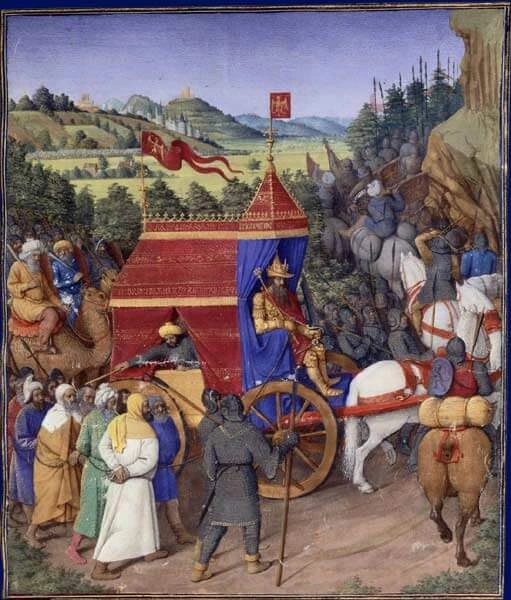Joschafat

In der Bibel wird König Joschafat von Juda im ersten Buch der Könige, in den Kapiteln 21 und 22, erwähnt. Er besteigt den Thron von Juda während der Herrschaft von Ahab in Israel.
Er hat die Weisheit, König Ahab oder Ahabs Propheten nicht völlig zu vertrauen. In einer Geschichte befragt er den Propheten Micha, um als Verbündeter Ahabs gegen den König von Syrien in den Krieg zu ziehen. Micha sagt, dass Jehova das Unternehmen segnen wird, aber dass Ahab getötet werden wird. Ahab hört dies und trifft Vorsichtsmaßnahmen, indem er Joschafat überredet, Ahabs Gewand zu tragen, während Ahab sich wie ein gewöhnlicher Soldat kleidet. Trotzdem wird Ahab getötet, während Ramoth-Gilead eingenommen wird.
Später erringt Joschafat einen weiteren Sieg gegen die Moabiter. Er scheint insgesamt ein guter König gewesen zu sein, der in den Fußstapfen seines Vaters Asa wandelte, der ebenfalls ein guter König war. Er schafft den Götzendienst auf den Höhen nicht ab, und seine Schiffe fahren nicht nach Tarschisch. Dies sind die beiden negativen Aussagen über ihn im wörtlichen Sinne.
In Swedenborgs Werken wird er nur an zwei Stellen erwähnt. Interessanterweise erwähnen beide Referenzen negative Punkte:
König Joschafat ließ Schiffe aus Tarschisch bauen, um nach Ophir zu fahren und Gold zu holen; aber sie fuhren nicht, denn die Schiffe gingen bei Ezion-Geber zu Bruch (1. Könige 22,48).
In diesem Vers scheint Joschafat für die Verderbnis der Kirche zu stehen, die durch die Verfälschung der Wahrheit entsteht. Hier ein Auszug aus Swedenborgs Werk "Apocalypse Explained":
"[D]ass die 'Schiffe' unter König Joschafat 'zerbrochen' wurden, bedeutet die Verwüstung der Kirche in Bezug auf ihre Wahrheiten und Güter." (Apocalypse Explained #514[7])
Ein Tal in der Nähe von Jerusalem wird das Tal von Joschafat genannt. Im Buch Joel, Kapitel 3, gibt es eine Prophezeiung über dieses Tal:
"12 Lasst die Heiden erwachen und zum Tal Josaphat heraufkommen; denn dort will ich sitzen, um alle Heiden ringsum zu richten." (Joel 3:12)
Auch in Apocalypse Explained findet sich ein Verweis auf diese Stelle:
"Dass das Gericht dann stattfindet, wird deutlich erklärt, 'das Tal von Joschafat', wo das Gericht vollstreckt wird, was die Verfälschung des Wortes bedeutet." (Apocalypse Explained #911[7])
(Verweise: 1 Koenige 22:48; Die Offenbarung Erklärt 514)
Arcana Coelestia #8770
8770. 'And you will be for Me a kingdom of priests' means that at that time the good of truth will be [with them]. This is clear from the meaning of 'a kingdom of priests' here as spiritual good, which is the good of truth, that is, the good that a member of the spiritual Church is brought to by means of truth. The reason why 'a kingdom of priests' means this good is that these words are addressed to the house of Jacob and the children of Israel, who represent the spiritual Church, external and internal - the house of Jacob representing the external Church, and the children of Israel the internal Church, 8762. Also 'a kingdom' means truth, 1672, 2547, 4691, while 'priests' means good, since the Lord's Priesthood, which was represented by priests, means Divine Good, and the Lord's Kingship, which was represented by kings, means Divine Truth, 1728, 2015 (end), 3670, 6148.
[2] In the representative Church among the descendants of Jacob there was first a kingdom ruled by judges, after that a kingdom ruled by priests, and finally a kingdom ruled by kings. The kingdom ruled by judges represented Divine Truth emanating from Divine Good, whereas the kingdom ruled by priests, who were also judges, represented Divine Good from which Divine Truth emanates, and the kingdom ruled by kings represented Divine Truth without Divine Good. But when the office of king also had some of the priestly functions attached to it, kings then also represented Divine Truth containing good in the measure that priestly functions were linked to the office of king.
[3] All this was brought about in the Jewish Church to the end that the states of heaven might thereby be represented. For in heaven there are two kingdoms, one being called the celestial kingdom, and the other being called the spiritual kingdom. The celestial kingdom is what is called the Lord's Priesthood, and the spiritual kingdom is what is called His Kingship. In the latter Divine Truth reigns, in the former Divine Good. And since the representation of the celestial kingdom began to perish when the people asked for a king, therefore - to ensure that something representing the Lord's kingdom in the heavens might nevertheless continue to exist - the Jews were separated from the Israelites. The Jewish kingdom then represented the Lord's celestial kingdom, and the Israelite kingdom His spiritual kingdom.
[4] If people know these things they are able to know why the changes in forms of government took place one after another among the descendants of Jacob. They are also able to know why, when the people asked for a king, they were told by Jehovah through Samuel that in doing so they rejected Jehovah so that He should not reign over them, 1 Samuel 8:7, and why they were told then about 'the right of the king', 1 Samuel 8:11 and following verses, which describes Divine Truth without Divine Good. If people know the things mentioned above they can also know why some priestly functions were conferred on David, and also why after Solomon's time the kingdom was divided into two, into the Jewish kingdom and the Israelite kingdom. Regarding the two kingdoms in heaven, see 3635, 3883-3896, 4112, 4113, 4138.






